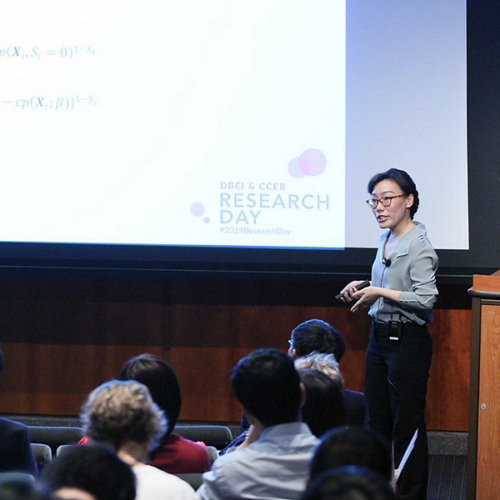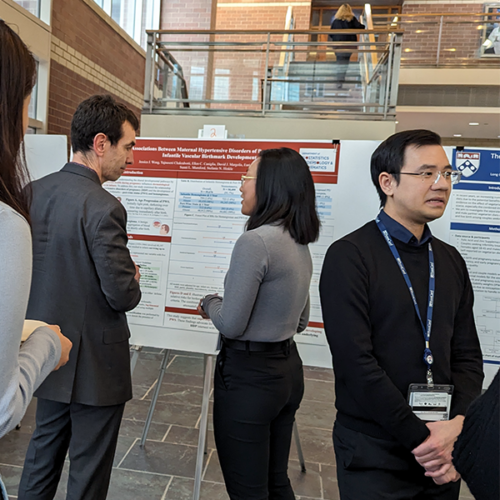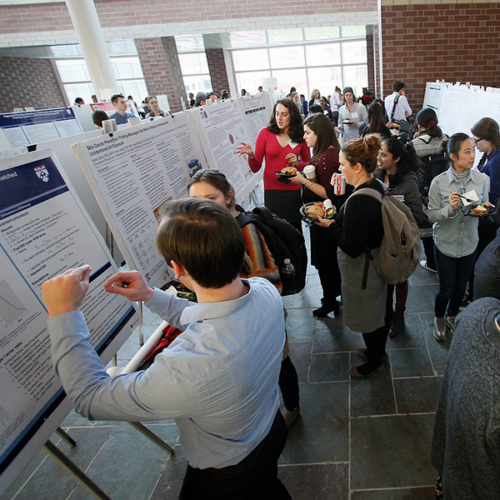Alumni Spotlight: Cameron Baston, MD, MSCE
Before joining the Perelman School of Medicine as an Associate Professor of Clinical Medicine, Cameron Baston, MD, MSCE, completed his MSCE at the University of Pennsylvania.
Explore our interdisciplinary educational programs, designed to prepare the next generation of leaders in biostatistics, epidemiology, and informatics.
The Master of Science (MS) in Biostatistics degree program is designed for individuals interested in the theory and applications of statistical methods, especially as applied to problems in the biomedical sciences. Courses include probability, mathematical statistics, epidemiology, and statistical methods including categorical data analysis, linear models, multivariate methods, survival analysis, statistical computing and applied data analysis. The program, which is administered by the Graduate Group in Epidemiology and Biostatistics (GGEB), is designed to be completed in two years of full-time study.
Learn More on the GGEB Website
The Doctor of Philosophy (PhD) in Biostatistics degree program is designed to educate and train individuals for successful careers as independent academic investigators able to develop, apply, and extend biostatistical methodology to address questions in biomedical research. The program is administered by the Graduate Group in Epidemiology and Biostatistics (GGEB) at the Perelman School of Medicine and many of the program’s core courses are designed and led by DBEI faculty members.
Learn More on the GGEB Website
The Master of Science in Clinical Epidemiology (MSCE) degree program is an intensive degree program for accomplished medical professionals who seek to further their skills as academic investigators. Applicants who possess an advanced degree in medicine, nursing, or another health field learn to design controlled epidemiological studies and acquire biostatistical skills relating to their research interests. The program, which is administered by the Center for Clinical Epidemiology and Biostatistics (CCEB), is designed to be completed in two to three years of full-time study.
Learn More on the CCEB Website
The Epidemiology Track of the Master of Public Health (MPH) degree program offers a highly focused curriculum for MPH applicants with career goals as a research epidemiologist, data analyst, or epidemiologic practitioner. This is a small and highly competitive track that is limited to full-time students. The track was created in partnership between the MPH program, Graduate Group of Epidemiology and Biostatistics (GGEB), and the Department of Biostatistics, Epidemiology and Informatics.
Learn More on the MPH Website
The Doctor of Philosophy (PhD) in Epidemiology degree program educates and trains individuals for successful careers as independent investigators in epidemiologic research. The program is administered by the Graduate Group in Epidemiology and Biostatistics (GGEB) at the Perelman School of Medicine and many of the program’s core courses are designed and led by DBEI faculty members.
Learn More on GGEB Website
The Clinical Research Certificate program provides non-credit, non-degree training for medical professionals, including clinical and postdoctoral fellows, residents, faculty, and medical students, who are conducting and collaborating on clinical research studies and affiliated with the Perelman School of Medicine. Courses address fundamentals of epidemiology and biostatistics, clinical trial design, database development, practical aspects of study conduct, research ethics, and regulatory compliance. The program, which is administered by the Center for Clinical Epidemiology and Biostatistics (CCEB), is designed to be completed over a single academic year.
Learn More on the CCEB Website
The Center for Clinical Epidemiology and Biostatistics (CCEB) offers six specialized training programs (NIH-funded “T32s”) in various epidemiological areas, designed to help fellows launch their careers as independently funded clinical research scientists and leaders in their fields. Each fellow conducts a rigorously mentored clinical research thesis, which culminates in a publishable result.
Learn More on the CCEB Website
Faculty members associated with the Department of Epidemiology, Biostatistics and Informatics and the Center for Clinical Epidemiology and Biostatistics (CCEB) facilitate Module I and Module II courses and research programs for medical undergraduates. These modules are designed to cultivate participants’ ability to critically appraise and apply information from medical literature.
Learn More on the CCEB Website
The Master of Biomedical Informatics (MBMI) degree program serves the needs of Penn Medicine by training the next generation of clinical informaticians who seek to leverage their background and practice as professional clinicians to bring state-of-the art informatics theory and practice to the clinical setting. The program, which is administered by the Institute for Biomedical Informatics (IBI) with oversight from the Penn Medicine Masters and Certificate Programs office, is designed to be completed in two-years of full-time study.
Learn More About the MBMI Program
The Biomedical Informatics (BMI) track of the Graduate Group in Genomics and Computational Biology (GCB) administered Doctorate of Philosophy (PhD) degree program is designed to train the next generation of quantitative scientists with an integrated and deep understanding of the biological basis of health and disease, and an emphasis on machine learning and artificial intelligence applications to health systems and health system data.
Learn More on the GCB Website
The Certificate in Biomedical Informatics serves students seeking training in biomedical informatics but not at a degree level. The curriculum consists of the same four core informatics courses required of the Masters-level students, but with the purpose of fostering informatics literacy within the Penn community.
Learn More About the Certificate in Biomedical Informatics
The Department of Biostatistics, Epidemiology and Informatics and Master of Public Health Program at the University of Pennsylvania have established an Epidemiology track within the MPH Program, an interdisciplinary graduate program focused on preparing the next generation of public health leaders.
Read More
Before joining the Perelman School of Medicine as an Associate Professor of Clinical Medicine, Cameron Baston, MD, MSCE, completed his MSCE at the University of Pennsylvania.
Before joining DBEI as an Associate Professor of Medicine and Epidemiology, Joshua F. Baker, MD, MSCE, completed his MSCE at the University of Pennsylvania.
Before joining Alnylam Pharmaceuticals, Inc. as a Director of Medical Affairs Biostatistics, Shaun Bender, MS, PhD, completed his PhD in Biostatistics at the University of Pennsylvania.
Before joining Brown University as an Assistant Professor of Biostatistics, Arman Oganisian, PhD, completed his PhD in Biostatistics at the University of Pennsylvania.
The Graduate Group in Epidemiology and Biostatistics (GGEB) stood out because they have a large number of faculty members compared to students, offering a wide range of research areas to explore. What really appealed to me is their approach of requiring three lab rotations before choosing a dissertation advisor and direction. It’s a practical and attractive feature that allows me to explore different options before committing.